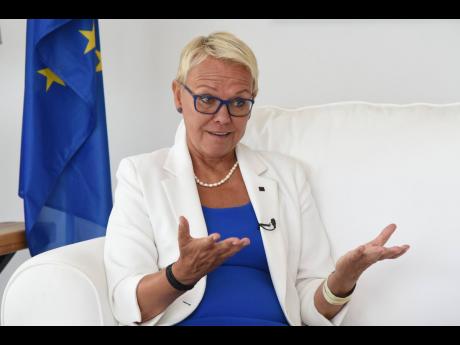EU not punishing Ja – ambassador - Europe working with partners despite hard line on money laundering, terrorism
The timing of the announcement of the blacklisting of Jamaica and other African, Caribbean and Pacific (ACP) states was unfortunate, Malgorzata Wasilewska, the outgoing European Union (EU) ambassador, has said.
In a Gleaner interview at the end of her assignment in the region, the EU diplomat acknowledged that it was “upsetting to know that your country has been greylisted or blacklisted”.
Wasilewska said it was too early to measure the impact of the listing on trade or the economy, particularly in the context of COVID-19.
“I think we need to revisit this topic in a few months to come, but I do need to stress that it is not punitive,” Wasilewska told The Gleaner.
However, she made it clear that the blacklisting of Jamaica did not mean that bilateral and regional programmes with the EU would be affected.
“It means that the institutions that were once engaged in financial transactions with the countries that are on the list will look a little bit more carefully,” she said.
In May, as developing states in the Caribbean and Africa grappled with the deleterious effects of the highly contagious coronavirus, Jamaica and other ACP states were placed on a new list of high-risk countries with strategic deficiencies in their regime regarding anti-money laundering (AML) and countering terrorist financing (CTF).
Panama, The Bahamas, Mauritius, Barbados, Botswana, Cambodia, Ghana, Jamaica, Mongolia, Myanmar, Nicaragua, and Zimbabwe are said to “pose significant threats to the financial system of the Union” because of failings in tackling money laundering and terrorism financing.
The Caribbean Media Corporation reported, at the time, that Georges Rebelo Pinto Chikoti, secretary general of the Organisation of African, Caribbean and Pacific States, had condemned the decision by the EU.
“At the moment where the COVID-19 pandemic is affecting the economies of these states and that while both member states of the EC (European Commission) and the OACPS are trying to find solutions to the crisis, the publication and the adoption of such a list would aggravate the health and economic crises which are already affecting the concerned countries,” Chikoti wrote in a letter to Gordan Grlic Radman, the co-president of the African Caribbean and Pacific-EU Council of Ministers.
RISK OF TERRORISM
Discussing the decision to place Jamaica and other regional states on the EU’s blacklist, Wasilewska indicated that the risk of terrorism and money laundering was a very important issue to Europeans.
She cited terrorist attacks in recent years that had a significant impact across Europe.
“There is a strong commitment that we address those gaps in the system inside Europe and work with our partners,” she added.
The EU diplomat pointed out that the Financial Action Task Force (FATF) had listed the countries earlier, adding that “our exercise is linked to the listing of FATF and the list of 40 deficiencies or gaps that needs to be addressed”.
In an earlier interview with The Gleaner, Finance and the Public Service Minister Dr Nigel Clarke said that Jamaica, like other countries, had been affected by a shift in FATF standards of measurement.
“If a country has strategic AML/CTF deficiencies, and its financial assets are deemed to be larger than the threshold of US$5 billion, the country’s financial sector is seen as large enough, in an international context, to warrant the direct, enhanced monitoring of the international body FATF – a process commonly known as greylisting.
“FATF suddenly changed the variable used to measure the size of financial assets from M2 to M3, a broader measure, without a corresponding increase in the threshold value. This happened a mere six months before the assessment date,” the finance minister said.
At its 30th Inter-sessional summit in St Kitts-Nevis earlier this year, Caribbean Community leaders said that the blacklisting of regional countries by the EU had brought considerable reputational damage to the bloc.
“Despite all member states, with the exception of one, being removed from the EU blacklist, the damage inflicted is irreparable and has consequential implications for building member states’ economic and climate resilience given their inherent vulnerabilities,” they said in the communique issued at the end of the two-day summit.

